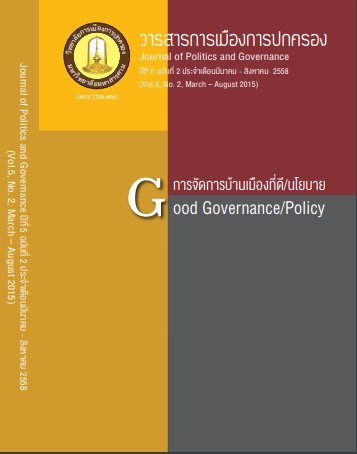New Social Movement: A Case Study of Thai Network of People Living with HIV/AIDS
Main Article Content
Abstract
The aim of this dissertation is to study how and why the people living with HIV/AIDS could work and create a network that functions in a manner of the New Social Movement. It investigates the case study of the network of the people living with HIV/AIDS in Thailand from 1997-2014. These dissertations also focuses on the formulation of the movement’s strategies, political bargaining which was related to democracy and democratic practices both inside and outside their movement. This dissertation found that the Thai government’s policy on these people led to human right violation, hatred against them, and social stigmatization. The researcher uses the concept “ Resource Mobilization Theory . It is found that these people worked together to create an identity for political bargaining. They were completed for public and policy recognition, through the National Health Bill ,Compulsory Licensing( CL) and protest against Free Trade Area (FTA) agreement. They also tried to re-identity new right, building HIV/AIDS network and decentralization of power that extended to local levels for decision making and participation.
State health policy put an emphasis on epidemiology, but overlooked social justice and a partnership between state and business in compulsory licensing drugs. It gave more people an access to medical service treatment. This framework reflected a negotiation and bargaining procedure between state and the movement in obtaining state welfare. The movement was operated beyond social class, bargaining for their own interests based on their identity. It was recognized in public sphere even though their movement operated from the margins. Their strength emerged from coalition with multiple parties and organizations from within and outside. They were able to create a network and partnership in mobilizing resources and participants both from NGOs, and scholars from both local and abroad. They were able to connect social force networks of national and international levels with evidence-based knowledge such as public heath care, international law, basic rights that extend beyond drug issue and the right to access other state welfare services.
Article Details

This work is licensed under a Creative Commons Attribution-NonCommercial-NoDerivatives 4.0 International License.
References
กรรณิการ์ กิจติเวชกุล. (2550).ความต้องการแสวงหากําไรไม่สิ้นสุดของอุตสาหกรรมยาปรากฏการณ์ในไทยและอินเดีย,กรุงเทพฯ: องค์การหมอไร้พรมแดน-เบลเยี่ยม
นิวัตร สุวรรณพัฒนา.(2553).สิทธิทางเพศ กับหน้าที่ และความรับผิดชอบ. หนังสือพิมพ์เสียงสิทธิ
ประภาส ปิ่นตบแต่ง. (2552). กรอบการวิเคราะห์การเมืองแบบทฤษฎีขบวนการทางสังคม. เชียงใหม่: มูลนิธิไฮน์ริค เบิลล์ สำนักงานภูมิภาคตะวันออกเฉียงใต้.
วรวุฒิ โรมรัตนพันธ์. (2552).ทุนทางสังคม: กระบวนทัศน์ใหม่ในการจัดการสิ่งแวดล้อม. กรุงเทพฯ:โครงการส่งเสริมการสร้างตำรา มหาวิทยาลัยธรรมศาสตร์.
Chris Lyttleton. (2000). Endangered relations: negotiating sex and AIDS in Thailand.;Amsterdam:. Harwood Academic Publishers.
DietlindStolle. (2007). “Social Capital”, in The Oxford Handbook of Political Behavior. Oxford: Oxford University Press.


